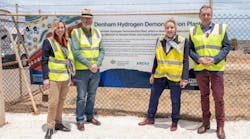Australia launches first remote renewable Hydrogen Microgrid in western region
Australia has launched its first remote renewable hydrogen microgrid at the A$9.3 million ($6.3M U.S.) Denham Hydrogen Demonstration Plant in Western Australia's Gascoyne.
The plant includes a 704-kW solar farm and a 100-kW fuel cell, along with a 348-kW hydrogen electrolyzer. The plant is expected to be fully operational in early 2023 and able to power the demand of 20% of Denham's residents and businesses.
It will also offset 140,000 litres of diesel annually and provide a decarbonisation pathway for future energy systems.
Horizon Power and Hybrid Systems Australia worked on this project.
“The Denham Hydrogen Demonstration Plant here in Shark Bay demonstrates the WA Government's drive to ensure Western Australia reaches its potential as a renewable hydrogen powerhouse,” Hydrogen Industry Minister Alannah MacTiernan said. “Once fully operational the plant will show how renewable hydrogen can be used to replace diesel and other fossil fuels to propel WA to net zero emissions by 2050. This project is the first step towards rolling out renewable hydrogen domestically - and has helped us build critical skills and understanding to move us along as a producer and user of renewable hydrogen."
The WA Government provided A$5.7 million for the project, including A$1 million through the Renewable Hydrogen Fund. The Australian Renewable Energy Agency provided A$2.6 million through its Advancing Renewables Program.
Fuel cells use a electrochemical process to convert hydrogen into electricity. An electrolyzer separates and collects the hydrogen component in water using electricity.
To be considered green hydrogen, the electrolyzers must be powered by renewable or carbon-free resources such as solar, wind, hydro or nuclear.
About the Author
EnergyTech Staff
Rod Walton is head of content for EnergyTech.com. He has spent 17 years covering the energy industry as a newspaper and trade journalist.
Walton formerly was energy writer and business editor at the Tulsa World. Later, he spent six years covering the electricity power sector for Pennwell and Clarion Events. He joined Endeavor and EnergyTech in November 2021.
He can be reached at [email protected].
EnergyTech is focused on the mission critical and large-scale energy users and their sustainability and resiliency goals. These include the commercial and industrial sectors, as well as the military, universities, data centers and microgrids.
Many large-scale energy users such as Fortune 500 companies, and mission-critical users such as military bases, universities, healthcare facilities, public safety and data centers, shifting their energy priorities to reach net-zero carbon goals within the coming decades. These include plans for renewable energy power purchase agreements, but also on-site resiliency projects such as microgrids, combined heat and power, rooftop solar, energy storage, digitalization and building efficiency upgrades.
